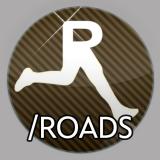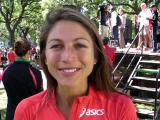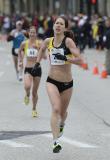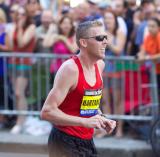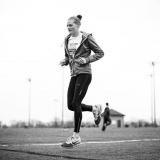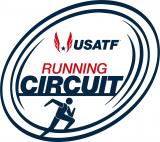Folders |
Aaron Braun is Looking for a RepeatPublished by
More Road Racing Ahead for Colorado RunnerBy Scott Bush Over the past decade, Aaron Braun has gone from being a 9:34 3,200m runner as a high school senior, to a six-time NCAA champion at DII powerhouse Adams State, to a consistent contender on the professional stage, to a national champion. At last year's .US National 12K, Braun ran away from the strong field to win by eight seconds, winning the inaugural race. This season, Braun didn't quite have the spring he wanted, regrouping over the summer, only to win both the Great Cow Harbor 10k and San Jose Rock 'n' Roll Half Marathon recently. With his mind focused on repeating as .US National 12K champion, as well as a future marathon looming in the not so far off distance, we caught up with Braun to talk training, Sunday's race, his progression as an athlete and much more. Follow Aaron: Twitter | Website | Facebook Scott Bush (SB): You’ve put in some serious mileage as of late. How are you feeling heading into the .US National 12K? Aaron Braun (AB): I am really excited about heading back to Alexandria. Last years race was so much fun, and such a great feeling of finally winning my first US title. I'm slowly beginning to allow myself to really remember all the little details of last year and cherish all those positive memories. I am hoping to be able to use those feelings to keep my thoughts very positive as I head back this year to take on what I believe to be an even stronger field than last year and retain my championship. SB: You’re defending champ, besting a good field last year. Are you approaching the race in similar fashion this year? It has to help knowing the course a bit better, right? AB: I try to approach every race a little differently, because every race is different in one way or another. Like I said above, I think the competition this year is even stronger than last year. Last year it seemed like I was one of only a handful in the field that wasn't coming off of running a fall marathon. This year there are a few guys who are coming off of one, but a lot more guys who, like me, this race is their biggest focus of the fall season. I liked the course last year, but I believe they have changed it this year. It looks to be a simple 'out and back' course which could make the race pretty interesting. SB: Cow Harbor and the San Jose Half were both very good to you, as you took home victories. Many guys ended their season right after track, but you seemed to rest and come back for another round late in the year. What's your strategy behind this? AB: My strategy behind this season was basically to adjust on the fly. I had what I considered to be a very disappointing spring season; my original plan coming out of the spring was to take a short break some time in July, and get ready to run a marathon at either Twin Cities, Chicago, or New York. But in July I just felt fried, and felt that I needed to take a longer break, and start back fresh. The bad part of that was I knew I wasn't going to get in good enough shape to run well at one of those marathons; but the good news was that I would be able to return back to this race in good shape. SB: On your blog, you mention your race at the .US National 12K and competing at the Manchester Road Race again...but you also mention a marathon. Have you picked which one you'll be competing in yet? AB: I know which marathon I want to run at, but my agent Ray Flynn wanted to wait to talk to them until after this 12k. There are many good options in the winter/early spring that if my original hope doesn't come through it shouldn't be hard too find another quality race around the same time; but I'm hoping it will work out with the race I've been thinking about, and will hopefully be able to announce that race soon after the 12k. SB: You debuted in the marathon at the LA Marathon back in March. You finished seventh in 2:19:51, but we know you were shooting for a bit better result. What did you learn from the experience? AB: My marathon debut was a very humbling experience; and in the immediate moments following the finish line, I was heartbroken that it hadn't turned out the way I wanted it to. But as more and more time has passed since then, I know that just like everything else that has happened in my life, it happened for a reason, and I need to do my best to learn from it. The biggest things I learned was what I want to try to do differently next time around. I believe the biggest thing was I needed to adjust my form. The big reason I blew up so bad, was that my quads completely locked up around 18 miles, and I just wasn't able to run anywhere close to the pace I needed to run to compete. I had also had quad issues when I ran my first ever half marathon, and after every 'longer' race, my quads have been unbelievably sore for the following days. I did some gait analysis a few months back, and was shocked to see how bad my form had become. I was leaning too far back, resulting in too much stress on my quads. They were strong enough to handle that stress over shorter distances like 5ks and 10ks, but to be doing that for 1 to 2 hours in a half or full marathon was too much. So I have been working really hard on leaning forward to relieve this problem. I believe it has worked wonders, as after my half-marathon in San Jose in October, my quads weren't really sore at all in the following days, when before I have barely been able to run the days after I race a half. SB: You live and train in Alamosa, where you went to college at Adams State. While the Grizzlies are a national contender every year, few know much about the town itself. What is Alamosa like for a professional runner and a family-man such as yourself? AB: Alamosa is an amazing place to train, as well as a great place to be starting my family. It is located in the middle of a valley at 7,500 ft. Being in the valley gives it a couple of unique advantages other places at altitude don't have. The first is that it is pancake flat. The stress of this high altitude is already pretty tough, and then when you add hills to that, you are really stressing your body. It is so nice to be able to do good long runs and tempo runs at a consistent effort and pace without dealing with hills. And when I want to get in some hill work to prepare for a hilly road or cross country course; there are so many beautiful mountain runs to go on that are only half an hour away. The other big advantage, which I will especially be grateful for in the coming winter months, is that we don't get as much snow as other high altitude locations. Most of the damage is done in the surrounding mountains, so by the time the snow clouds get to Alamosa, we hardly get any white stuff. The trade off is that it gets extremely cold; I've done some runs in December and January where I finish my run, and it has just 'warmed up' to 0 degrees Fahrenheit. But for me, that's a good trade off as all I have to do is wear more nice adidas clothes to stay warm, instead of slipping and sliding around in the snow or being forced to run on a treadmill. SB: The roads and the track are different animals. How do you treat them differently, especially considering you race on each a fair amount? AB: For me, I really enjoy the pure racing aspect of the roads. Time is such a huge aspect to the track, that I sometimes end up worrying more about the splits on the clock each lap, as opposed to what is happening in the race itself. That is not nearly as big of an issue in road races. Sure, I still occasionally want to run a new PR on the roads, but much more important is what place I finish. I think this helps me race to my fullest potential because I've always felt I am much better at head-to-head kind of races where the focus is on place, not time. |
